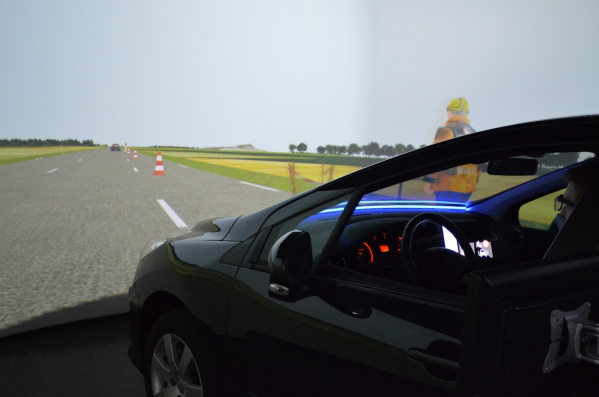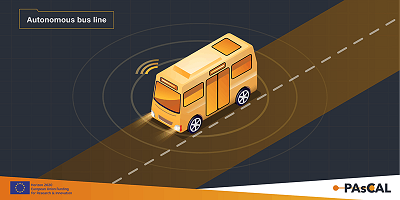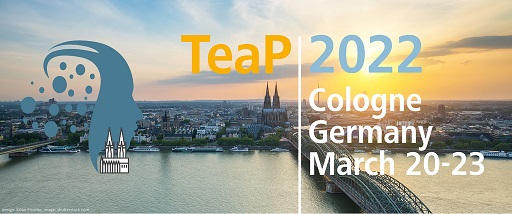News
-
 November 2022
November 2022CAV acceptance: simulation experiments results (French)
Hybrid EventAn event will be held UBFC both online and on-site.
Experiment conditions and results will be presented and discussed by researchers and participants to the tests will bring their experience to the discussion.
Attendees in presence will be given the opportunity to visit the simulation platforms.
Agenda:
Introduction to CAVs
Presentation of XP1 and its results
Tesimony of a XP1 volunteer participant
Presentation of XP2 and its results
Q/A
Speakers of the event:
Maxime Larique
Nicolas… -
NewsNovember 2022
PAsCAL at the TRA 2022 In Lisbon
News postPAsCAL will showcase its activities and results at the TRA 2022, which is taking place in Lisbon from today till Thursday 17th.
Here is when you may follow us:
Monday 14 November at 17-18.30
Poster Pitch Presentations: Smart Solutions and society700 Designing CAVs with vulnerable travellers in mind: Requirements to bridge the gap to full accessibility / Friederike L. Kühl, Etelätär Innovation, Estonia
Tuesday 15 November at 8.30-10
Podium presentations: Connected and Automated Multimodal… -
NewsOctober 2022
HOW DO WE WILL INCREASE ACCEPTANCE OF AUTONOMOUS VEHICLES? PASCAL PROJECT SHOWS YOU HOW!
EventCELEBRATING THE ACHIEVEMENTS OF PASCAL
For more than 3 years, H2020 PAsCAL project aimed at enhancing driver behaviour and Public Acceptance of Connected and Autonomous vehicLes.
PAsCAL’s ultimate goal is to create a“Guide2Autonomy” (G2A), a set of guidelines and recommendations aimed at accelerating user-friendly evolution of connected automated vehicles and transport systems.
You are invited to presentations and discussions taking place in Belval that kick off at 17:00 on October… -
NewsSeptember 2022
A High-Tech Alternative to Private Cars
News postCar-sharing with automatic functions and modern self-driving shuttles, heroes of the tests scheduled by the PAsCAL project in Luxembourg
Roadmaps on automation put a lot of emphasis on shared mobility technologies. However, still little is known about the attitudes towards future sharing schemes. Within the European project PAsCAL, the pilot “Shared connected transport” studied attitudes and perception of “drivers” and passengers toward two different shared connected vehicles: an autonomous… -
NewsJuly 2022
Young Driver's Training Needs
EventRED Driver Training will participate in a free one-day symposium hosted by the Nottingham Trent University on July 8th. The symposium will try to answer questions such as What training do young drivers feel they need? Do they understand modern cars and their safety systems?...
The event will be held in-person, registration is mandatory at: youngdriversymposium.eventbrite.co.uk
The schedule can be downloaded below.
-
NewsJune 2022
Pedestrians behavior vs CAVs
Hybrid EventPAsCAL presents the results of the experiment on pedestrian behavior facing fully autonomous vehicles, carried out at LIST during summer 2021.
The event will be held in the Luxembourg Learning Centre (Belval), on Tuesday 28th of June from 18:00 to 20:30, and will also be broadcasted remotely. Presentations will be held in French and English.
Participation is free but registration is mandatory
to participate in presence, please contact Guillaume Gronier: guillaume.gronier@list.lu
to… -
 March 2022
March 2022PAsCAL Autonomous Bus Line: Conclusions and Learnings
EventEtelätär Innovation invites you to join the final event of a pilot exploring the acceptance of L4 autonomous vehicles in mixed traffic online and free of charge. The pilot explored both the perception of vehicle passengers as well as co-road users of the vehicle.
We share not only the experience and insight we have gathered of 3 seperate pilot waves over 6 months and involving more than 200 individual participants, but also the key conclusions of our research.
Agenda:
Time
Topic
Speaker… -
NewsMarch 2022
Autonomous Driving: Who accepts which solution and why?
News postThe main results of the surveys about acceptance and intention to use of CAVs conducted within the PAsCAL project, were presented by Dr Tobias Vogel at the TeAP2022 Conference.
His presentation may be found here -
 March 2022
March 2022PAsCAL at TeaP 2022
EventNext March 22nd, Tobias Vogel of the University of Mannheim will present the results of the PAsCA project surveys at the TeaP 2022 (Tagung experimentell arbeitender Psycholog:innen; Conference of Experimental Psychologists) The TeaP is a well-known psychological research conference of junior and senior scientists from different fields of Experimental Psychology (e.g., cognitive, social, developmental, biological, clinical, educational, media, or economic psychology as well as other applications…